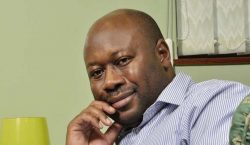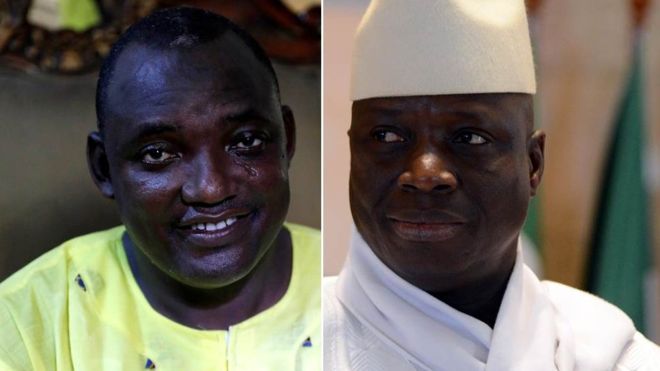



Yahya Jammeh, right, lost the election to Adama Barrow, left
GAMBIAN leader Yahya Jammeh has rejected the result of the presidential election held earlier this month, a week after admitting defeat.
Speaking on state TV, Mr Jammeh cited “abnormalities” in the vote and called for fresh elections.
Mr Jammeh, who came to power in a coup in 1994, suffered a shock defeat to Adama Barrow, who won more than 45 percent of the vote.
The US “strongly condemned” Mr Jammeh’s statement.
“This action is a reprehensible and unacceptable breach of faith with the people of The Gambia and an egregious attempt to undermine a credible election process and remain in power illegitimately,” said state department spokesman Mark Toner.
Mr Barrow, a property developer, is due to take office in late January. Mai Ahmad Fatty, the head of his transition team, told Reuters they were “consulting on what to do”, adding: “As far as we are concerned, the people have voted. We will maintain peace and stability and not let anyone provoke us into violence.”
The Gambia is the smallest country on mainland Africa, with a population of fewer than two million.
Mr Jammeh said that he now rejected the results of the election “in totality”.
“After a thorough investigation, I have decided to reject the outcome of the recent election,” Mr Jammeh said.
“I lament serious and unacceptable abnormalities which have reportedly transpired during the electoral process.
“I recommend fresh and transparent elections which will be officiated by a God-fearing and independent electoral commission.”

Yahya Jammeh appeared on state TV brandishing a document supposedly proving irregularities when the votes were tallied last week.
Mr Jammeh said the results were unacceptable. He said figures had been transposed swelling the number of votes in favour of his opponent, Adama Barrow, whom he recognised as president-elect live on television after the election results were announced.
Yahya Jammeh called for a fresh vote.
Over the past week people have been celebrating the end of his 22-year-long rule but tonight The Gambia’s future looks uncertain again.

The government in neighbouring Senegal condemned the move and called for an emergency meeting of the UN Security Council. Foreign Minister Mankeur Ndiaye, speaking on national television, urged President Jammeh to respect the election result.
A Human Rights Watch spokesman also said it was “deeply concerned”.
“The international community, notably [regional bloc] Ecowas and the African Union, should loudly protest any unlawful attempt to subvert the will of the Gambian people,” said Babatunde Olugboji, deputy programme director.
The streets of the capital, Banjul, were reported to be calm on Friday night although soldiers were seen placing sandbags in strategic locations across the city, AFP news agency reports.
Only last week, Mr Jammeh was shown on state TV calling Mr Barrow to wish him well.
“You are the elected president of The Gambia, and I wish you all the best. I have no ill will,” he said at the time.
According to the electoral commission, the result of the vote on 1 December was:
In his 22 years in power, Mr Jammeh acquired a reputation as a ruthless leader.
Ahead of the election, Human Rights Watch accused him of using violence to silence critics. The group said two activists had died in custody and dozens of people had been jailed and denied medical or legal help. bbc.com
newsdesk@fingaz.co.zw
Follow us on Twitter on @FingazLive and on Facebook – The Financial Gazette